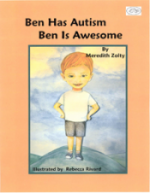
Let’s play a little game.
I have two children, one with Autism and one without. So I’ll tell you something about each of them and you try to guess which child is which.
First, some background
Cameron is 6.5 years old now and has Autism.
Tyler turns 4 in 2 weeks (so we’ll just pretend he is 4) and does not have Autism… nor any other disorders/syndromes that we’re aware of.
So I’ll tell you something, then you tell me which child is which. I’ll put the answers at the bottom.
Which is which?
1. One child refuses to eat most foods while the other child loves to eat most foods.
2. One child loves working with his hands, doing arts and crafts while the other child does not.
3. One child loves sweet foods, such as chocolate and the other child prefers salty foods, such as chips.
4. One child has several friends at school while the other has a hard time making friends.
5. One child says “fine, you’re not my friend anymore!” and storms off to his room when mad. The other child hits, kicks, throws things and screams uncontrollably.
6. One child has to have a hug and kiss before bed while the other prefers a comfy blanket.
7. One child is eager to go to school and play while the other feels abandoned and lost.
8. One child gets very sucky and whiny when sick while the other child shuts down and sits quietly all day.
9. One child could listen to his mom read a story book for hours while the other can’t make it through a single page.
10. One child can throw a ball like a 6 year old while the other child can throw a ball like a 3 year old.
Have you figured who is who?
Based on everything you know about Autism, some of these answers should be fairly obvious. However, I think some of them may still surprise you. For the answers, read below.
Which witch is which? The answers!
Alright, here we go… and remember, Cameron is 6 and has Autism. Tyler is 4 and does not have Autism.
1. Cameron was a born pasta eater. He has refused to eat meat since birth, refused almost all vegetables and most fruits, preferring primarily to eat pasta, cheese and potatoes. He ate his food mashed/blended right up until his 6th birthday. Which was great because we could hide meats and veggies in his food that way.
Tyler, on the other, went straight from baby formula to chicken wings and ribs. That kid will eat virtually anything.
2. The child that loves to do arts and crafts and is always dying to do things with his hands is Tyler. He’s our little artist, usually preferring to paint or work with play dough rather than playing a video game or going somewhere.
Cameron’s main areas of interest are books, video games and movies… in that order. He loves how the stories play out.
3. Our choco-holic is Cameron. He has a sweet tooth and would eat an entire Easter bunny in one sitting if we let him. Meanwhile Tyler would likely take 2 hours to eat a bunny’s ears and have it melted all over the place. But a bag of chips? He’d devour in minutes.
4. The popular boy at school is Cameron. He has several friends, even one that he considers his best friend. He even has some friends in another class besides his.
Tyler, on the other hand, is very shy and would rather hide behind me (if I’m there) than talk to anyone… even teachers. He’s very uncomfortable talking to anyone at school. In contrast though, he has the most amazing, hilarious and vibrant personality… once you can get him to talk.
5. So which child hits, kicks, throws and screams when he gets mad? Tyler. Tyler has always been unusually aggressive when he gets upset and even though he’s about to turn 4, it has not slowed down.
Cameron used to get plenty mad and still has complete meltdowns to this day (just not as frequent) but he has never been aggressive/violent. He will break things, but doesn’t throw anything at anyone or hit anyone. These days, he tends to just leave and find a place to be by himself.
6. My hugger and kisser before bed is Cameron. He refuses to let me leave his bedroom at bed time without getting a hug, a kiss and then he also kisses me on each cheek. It’s his bed time ritual.
Tyler often wants a hug and kiss too, but mostly when Cameron reminds him of such a thing. Sometimes even then he will just snuggle up with his “blankey” and be perfectly content in me just getting out of there to leave him sleep.
7. Since you’ve read the friend answer above, you likely know the answer to this one… Tyler feels abandoned at school. Every single day he tells us that he does not want to go despite the fact that he actually has a lot of fun while there and does very well.
Cameron, on the other hand, looks forward to getting back there on Monday after having a couple of days off. He really enjoys being there.
8. Our sucky and whiny sicky is Tyler. He cries easily, wants stuff all the time, always feels so miserable… he becomes a very big handful when he’s sick.
Cameron though, is quite the opposite. In fact, sometimes we don’t even know he’s sick until later in the day when we realize that he just isn’t getting off the couch or doing much of anything. If he seems quieter than normal, less active… then we check his temperature. Most of the time, that’s how we know there’s something wrong.
9. Again, I’ve sort of already answered this one but my story book lover is Cameron. Not only does he absolutely love stories, he becomes fully immersed in them. You can read a story to him in September one time and he can tell you about it in April. He doesn’t just memorize it though, he understands it and enjoys it.
Tyler has a very short attention span for stories. He either talks through it or wanders off. He says he does like the stories, he says he does want to hear a story but he just can’t sit still for that long.
10. Throwing a ball… you likely know where I’m going with this one.
Cameron is the one that throws like a 3 year old while Tyler can throw like, probably better than, a 6 year old.
Cameron, due to his Autism, and lack of wanting to really even try much, has under developed motor control. That is to say, he doesn’t have the muscle capacity or muscle control to hold, swing, release and get the ball moving very far, very fast or very accurately.
Tyler, on the other hand, can throw a ball pretty far. He’s always eager to throw the ball for our dog, he’s always eager to throw anything that he sees me throw to see if he can do it. Also, his temper tantrums that I mentioned earlier give him lots of practice in the throwing department as well.
So how did you do?
Some of the questions were a bit personal and if you don’t read much of my blog, may be a shot in the dark while other questions may seem obvious due to the traditional symptoms of Autism.
Still though, I bet some of the answers may have come as a surprise, for the same reason… the traditional symptoms of Autism.
And that’s the problem, isn’t it? Autism is such a varied and complicated disorder… what may be true for 1,000,000 autistics isn’t necessarily true for the next autistic that you meet.
As much as it’s possible for a child without Autism to be super shy, aggressive when mad, picky when eating or any other trait you might associate with Autism, it’s also possible for a child that does have Autism to not have those traits.
I certainly didn’t write this to trick anyone… these are honest answers. I really did write about my boys.
But perhaps it will help to demonstrate just how little we can simply assume to know about a person. Common traits are not guaranteed traits.
So, how did you do? Please share in the comments. I’d love to hear from you.
 The Book
The Book












